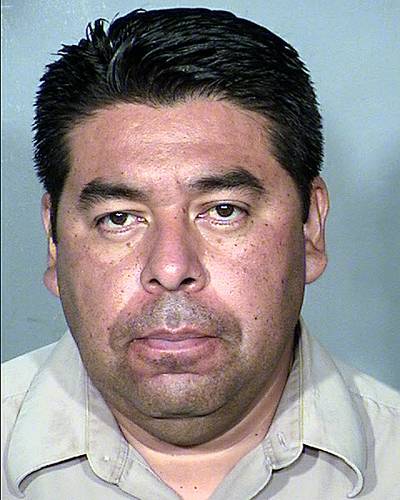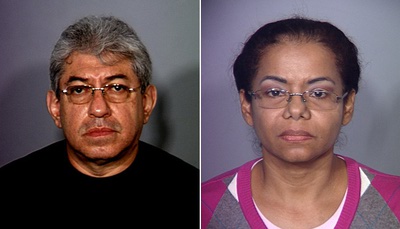Friday, June 6, 2014 | 2 a.m.
Late last month, health investigators and police responded to a tip about an unlicensed medical practice that housed a handful of suites in a Las Vegas office complex.
When investigators from various licensing boards arrived with Metro Police detectives, they were surprised at the scope of the operation.
“It sounds like it was a one-stop shop,” said John Hunt, general counsel for the Nevada State Board of Dentistry, which did not have investigators present for the raid but was looped in later.
Inside, police found more than a dozen packages of various medications, from antibiotics and multivitamins to Viagra, appetite suppressants, painkillers and asthma remedies. One drug on hand, Cardispan, is an injectable weight loss drug not approved by the U.S. Food and Drug Administration.
In addition to the medications, authorities found dentistry chairs, exam tables, syringes and unregistered X-ray machines in the clinic.
Eric Vargas-Rivera, 31, was arrested for furnishing drugs without a prescription. Vargas-Rivera is from Mexico, and told police he was importing the medications illegally from his home country. He also said he is a licensed doctor in Mexico, but not in the United States.
His arrest came two years after state officials launched an effort to combat unlicensed health care providers, prompted by a high-profile case in which a woman died after undergoing a procedure in a clandestine clinic.
In the wake of the arrest, questions have arisen about the effectiveness of the crackdown.
State health inspectors say they are still getting a number of complaints, but legal authorities aren’t taking action and therefore the problem continues.
But the Nevada Attorney General’s Office suggests the crackdown prompted illegal practitioners to leave the area and for demand for their services to dry up amid greater awareness by the public about the dangers of the services.
The State Board of Dentistry has investigated two to three cases per year during that time, and the State Pharmacy Board reported that it has received two to three complaints per week, most often related to illegal Botox and vitamin B-12 injections.
But since 2012, the state attorney general’s office has prosecuted just two cases related to unlicensed health care providers. In addition, a prosecutor from the Clark County District Attorney’s office said few cases have been sent to the office from law enforcement over the past year.
Hunt and Paul Edwards, general counsel for the state pharmacy board, said they would like to see more prosecutions of the cases the boards bring to law enforcement. Although Edwards can levy a $5,000 fine, new state laws passed last year made unlicensed practice of medicine a felony, and the district attorneys and state attorney general wield greater power.
But Jennifer Lopez, public information officer for the attorney general’s office, attributed the small number of prosecutions to the effectiveness of the crackdown.
“This could be because the campaign was so successful that people are no longer seeking services from unlicensed physicians and/or those were providing the unlicensed services realized that law enforcement and state agencies were monitoring and prosecuting violators,” she said.
Alexandra Chrysanthis, Clark County chief deputy district attorney in the case assessment unit, said the difficulty of finding witnesses to testify and collecting sufficient documentation of violations were hurdles to prosecuting illegal clinic operators.
“The hardest part in these cases typically is finding a willing witness,” Chrysanthis said. “It can be hard to get people to cooperate, especially if they haven’t been harmed. If they went to an unlicensed dentist and got a root canal, and it all turned out OK, they probably aren’t going to complain.”
In 2012 the state, bringing together several agencies including to the Nevada Division of Public Health and the Attorney General’s office, launched the campaign to educate the public and boost enforcement of illegal clinics. The problem was especially evident in immigrant communities, where lack of insurance, cost concerns and language barriers funneled people to unscrupulous businesses.
In 2013, the state Legislature passed two laws regarding unlicensed health care, establishing rules for reporting infractions to law enforcement and increasing penalties.
But community organizer and former Clark County School Board member Jose Solorio said the new laws and the crackdown hadn’t eliminated demand for clandestine services.
He said immigrants, especially ones in the country without legal residency, are in a tough spot when it comes to medical care.
“Undocumented immigrants need health care and they are excluded from Obamacare and Medicare,” Solorio said. “That leaves UMC or the neighborhood pharmacy or office that caters to them. We are funneling service away from mainstream medical care and then penalizing the medical care that exists to serve this marginalized community. Because all of the laws exclude undocumented immigrants, it doesn’t leave much choice.”
The tip on Vargas-Rivera originally came through the Metro Crimestoppers program, and then both the Medical Examiners Board and Nevada Board of Pharmacy helped investigate.
“This particular facility was much more sophisticated than others,” said Hunt, who has been the Dentistry Board’s general counsel for three decades. According to Hunt, he had already filed an injunction against a woman found on the premises during the raid for previously working as a dental hygienist without a license.
Edwards said investigators believed other unlicensed professionals were involved as well.
“It looked like they had a number of patients and were doing a number of procedures,” he said.
Similar to previous high-profile cases in Clark County, Vargas-Rivera, who only speaks Spanish, appeared to be working mostly with Hispanic patients. In April 2011 a woman died after going to see two unlicensed Colombian nationals who were offering Botox injections and plastic surgery. After a botched buttocks lift, the patient was abandoned and later died.
The death prompted the public awareness campaign, which, according to one state official, has been effective over the past two years.
“We made a lot of progress with that campaign,” said Chad Westom, bureau chief for preparedness, assurance, inspections and statistics for the Nevada Division of Public and Behavioral Health.
“We have seen more cases, and more people coming forward after the campaign. But I still think there is more that can be done. I think there is more out there, and some people are still reluctant to say everything. We can work still on breaking down some of those cultural barriers and making people more comfortable to come forward.”
Edwards said better communication between law enforcement and the licensing boards would help link investigations to the proper agencies and lead to more prosecutions and harsher punishments for violators.
Hunt said the laws should go a step farther and require all licensing boards to investigate every tip they get of unlicensed practice of medicine. If they find evidence the person is unlicensed they should be compelled coordinate with law enforcement. He added that the district attorney should have a time limit, such as three days, for making a determination on prosecuting after they receive a case.



Join the Discussion:
Check this out for a full explanation of our conversion to the LiveFyre commenting system and instructions on how to sign up for an account.
Full comments policy